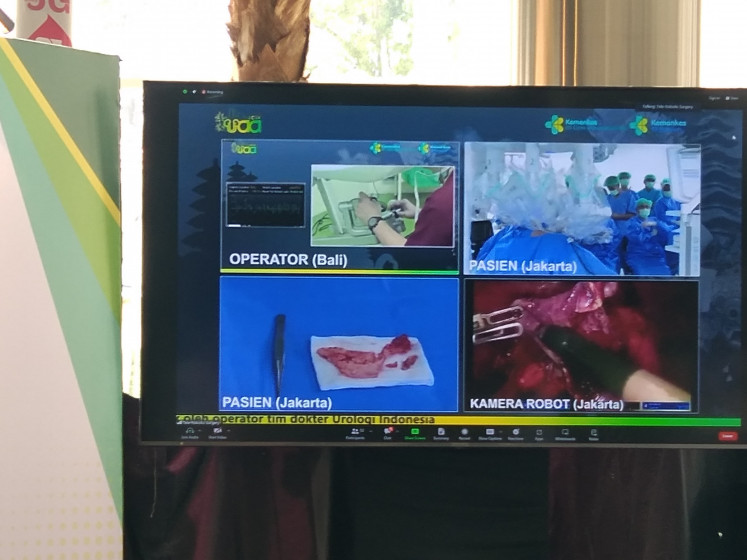Popular Reads
Top Results
Can't find what you're looking for?
View all search resultsPopular Reads
Top Results
Can't find what you're looking for?
View all search resultsLack of parental guidance, misuse of social media causes depression
Reaching out: Psychologist Kasandra Putranto has warned that parental guidance is critical to helping teenagers avoid suicidal tendencies
Change text size
Gift Premium Articles
to Anyone
_0.jpg) Reaching out: Psychologist Kasandra Putranto has warned that parental guidance is critical to helping teenagers avoid suicidal tendencies. In a recent case, Mayang Ariesti, a 16-year-old student of state senior high school SMA 7 Pontianak, West Kalimantan, hanged herself in her bedroom. She had been sharing her personal problems on her Facebook account, including problems with her boyfriend who, she suspected, was cheating on her, before she committed suicide. (Kompas) (Kompas)
Reaching out: Psychologist Kasandra Putranto has warned that parental guidance is critical to helping teenagers avoid suicidal tendencies. In a recent case, Mayang Ariesti, a 16-year-old student of state senior high school SMA 7 Pontianak, West Kalimantan, hanged herself in her bedroom. She had been sharing her personal problems on her Facebook account, including problems with her boyfriend who, she suspected, was cheating on her, before she committed suicide. (Kompas) (Kompas)
Reaching out: Psychologist Kasandra Putranto has warned that parental guidance is critical to helping teenagers avoid suicidal tendencies. In a recent case, Mayang Ariesti, a 16-year-old student of state senior high school SMA 7 Pontianak, West Kalimantan, hanged herself in her bedroom. She had been sharing her personal problems on her Facebook account, including problems with her boyfriend who, she suspected, was cheating on her, before she committed suicide. (Kompas)
Psychologists have warned that a lack of attention from parents will lead to a greater chance of teenagers suffering from depression.
With poor guidance, teenagers also tend to misuse social media, which could eventually lead them to have a higher tendency to suffer psychological disorders, with more risk of committing suicide.
Kasandra Putranto from Kasandra & Associates said that a lack of quality psychological guidance, particularly from parents, led many teenagers to be susceptible to negative influences, some of which were the impacts of technology.
As a result, she said, many teenagers these days did not have the resilience to shield themselves from losing their identities. As they lost their individual qualities and moral values, teenagers tended to get melancholic and used social media to channel their feelings.
"Teenagers are now susceptible to negativity, ranging from violence, drugs, pornography, addiction and criminality, to suicidal tendencies caused by depression," Kasandra told thejakartapost.com.
She cited a recent case in which a 19-year-old girl pimped underage girls through social networking site Facebook.
The psychologist said the crime was not only an example of the misuse of social media but also showed a psychological disorder stemming from a degradation of moral values.
The tragic death of Mayang Ariesti, a 16-year-old schoolgirl, is another example of young people's heavy reliance on social media.
Mayang an 11th grade student at state senior high school SMA 7 Pontianak, West Kalimantan, was found dead in her room last Monday morning, apparently as a result of suicide. It was later revealed that Mayang posted a series of depressed status updates on her Facebook account before she committed suicide. On her Facebook account, Mayang shared problems she was facing, including with her boyfriend who, she suspected, was cheating on her.
Kasandra said parents had the responsibility to educate their children, in which they should strengthen their moral values and teach them to think rationally, so that their children could make their own decisions and not be submissive to other people's demands.
She further said teenagers needed to be monitored, especially during their transformation phase to becoming adults. This was because teenagers' prefrontal cortex ' the part of the brain that regulates cognitive, emotional and behavioral functioning ' tended to be out of control when they felt ecstatic thus leaving their minds vulnerable to external influences. However, Kasandra said, parents' efforts alone would not be enough to keep teenagers on the right track as external influences from schools, society, the media and government also played important roles in shaping teenagers' behavior.
'Thus, Indonesia's education system should be more focused on educating moral values for children at an early age, instead of burdening them with academic subjects,' said Kasandra, adding that Indonesia's media should support children's development by providing entertainment suitable for young people.
Similarly, Anna Surti Ariani, a children and family psychologist, said schools needed to change their approach by engaging students to cooperate with each other since the current ranking system was heavy on competition, in which students are compared with each other.
Anna said such a system would lead students to suffer depression, increasing suicidal risks among them.
"Those who commit suicide are often those who feel defeated in a competition. In some cases, kids who have been bullied commit suicide because they feel lost," Anna told thejakartapost.com.
At home, Anna asserted, parents should strengthen their bonds with children since the most important aspect of children's education at home was not simply the parents' presence, but more on the level of attachment shared between them.
"Children really need to feel that they are loved and cared for," said Anna. The psychologist further explained that if parents were able to build strong attachments and bonds with their children, the risks of children adopting negative behavior and misusing social media would be reduced as children would think twice about their parents because they cared for them.
Parents should also monitor the use of gadgets, Anna said, as nowadays there were fewer and fewer people, including teenagers, who had friends in real life because they were busy talking with people through social media. In the long run, this would result in the inability of people to talk face-to-face with others.
"People who are addicted to social media have a bigger tendency to be depressed," said Anna. (ebf)









